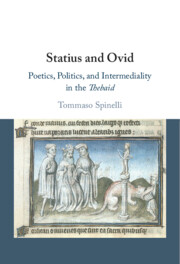Book contents
- Statius and Ovid
- Statius and Ovid
- Copyright page
- Contents
- Acknowledgements
- Note on Texts and Translations
- Abbreviations
- Introduction
- 1 The Post-Ovidian World of the Thebaid
- 2 Rewriting the Foundational Myths of Rome
- 3 Forging Divinity, Conceptualising Power
- Conclusion
- Appendix
- References
- Index Locorum
- General Index
Introduction
Published online by Cambridge University Press: 25 March 2024
- Statius and Ovid
- Statius and Ovid
- Copyright page
- Contents
- Acknowledgements
- Note on Texts and Translations
- Abbreviations
- Introduction
- 1 The Post-Ovidian World of the Thebaid
- 2 Rewriting the Foundational Myths of Rome
- 3 Forging Divinity, Conceptualising Power
- Conclusion
- Appendix
- References
- Index Locorum
- General Index
Summary
The Introduction offers an analysis of the poem’s proem to offer a first example of the methodology of the book and of Statius’ sophisticated engagement with Ovid. A discussion of the historical context in which the poem was composed warns readers about the risks of interpreting the Thebaid only in the light of the anti-Domitianic writings of Tacitus, Suetonius, and Pliny, suggesting the importance of non-literary and material sources. A critical overview of the scholarly debate on the Thebaid and the exploration of ancient reading habits – including the consideration of attestations of Ovidian stories in frescoes and monuments – suggests that intertextuality can consist of interactions of meanings (potentially independent of verbal allusions). Furthermore, texts can engage in dialogue with the semantics of both textual and non-textual narratives. Accordingly, the introduction suggests that the study of the Thebaid’s poetics and politics (broadly understood) involves the exploration of how different kinds of intertextual and intermedial interplays shape the poem’s engagement with both past literary models and the contemporary realities of Flavian Rome.
Information
- Type
- Chapter
- Information
- Statius and OvidPoetics, Politics, and Intermediality in the <I>Thebaid</I>, pp. 1 - 30Publisher: Cambridge University PressPrint publication year: 2024
